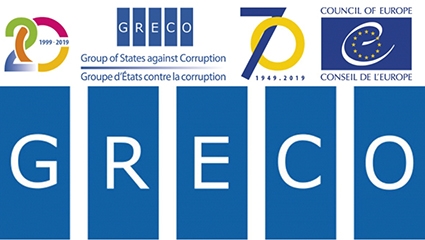GRECO Report: Georgia Fulfilled 5 of 16 Corruption Recommendations
The Group of States against Corruption (GRECO), the Council of Europe’s anti-corruption monitoring body with headquarters in Strasburg, has released the Fourth Evaluation Round compliance report for Georgia which reads that the country has fully fulfilled only five of a total 16 recommendations given in 2016.
Under the GRECO procedures, the Government of Georgia had to take into account the recommendations within the next two years and provide information to the GRECO Secretariat.
In the Fourth Evaluation Round, GRECO examined whether the corruption prevention legislation and practice were in compliance with the CoE standards in three different areas: the Parliament, the Judiciary and the Prosecution Service.
In early 2019, GRECO, in the Compliance Report, assessed the implementation of the recommendations issued in 2016 and stated on July 2 that Georgia has implemented satisfactorily five of the sixteen recommendations contained in the Fourth Round Evaluation Report.
“Of the remaining recommendations, eight have been partly implemented and three have not been implemented,” the report reads.
One of the 16 recommendations set out by the GRECO Fourth Round Evaluation Report, ‘Improvement of the Monitoring Mechanism for Asset Declarations,’ was related to all three evaluated agencies: the Parliament, the Judiciary and the Prosecutor's Office and was considered fulfilled.
Three of the recommendations were related solely to Parliament and called on guaranteed transparency of the legislative process and the uniform practice of public consultation in this process, the adoption of a Code of Ethics by the members of Parliament, enforcement of that Code and the obligation of MPs to make ad hoc declarations on conflicts of interest. From the three recommendations with regards Parliament, GRECO did not consider any recommendation to have been fully implemented.
The NGO Institute for Development of Freedom of Information (IDFI) says that despite the fact that GRECO saw progress in all three recommendations, it highlighted important flaws in the legislation.
Six of the total 16 recommendations regarding prevention of corruption were directed towards the Judiciary. GRECO called on the Georgian government to:
• Reform of the appointment and promotion of judges for the purpose of ensuring the reasonability, objectivity and transparency of the decisions in this process;
• Upgrade legislation on the transfer of judges in such a manner which enables the transfer from one court to another without the consent of the judge only in exceptional circumstances;
• Improve the system of case distribution within the court in order to ensure objectivity and transparency of the process;
• Adopt norms of judicial ethics and their implementation in practice;
• Ensure efficiency, transparency and objectivity of disciplinary proceedings of judges;
• Limit absolute immunity of judges to functional immunity.
“In most cases, GRECO has acknowledged the progress in implementing recommendations by the Judiciary. In particular, GRECO considered the recommendations regarding the transfer of judges and the case distribution to have been implemented in a satisfactory manner…It considered unimplemented the recommendation regarding the absolute immunity of judges,” the NGO says.
IDFI also says that the shortcomings found by GRECO in the implementation of the recommendations are related to the following issues: the obscurity of the judicial promotion process on which the Georgian authorities have not taken measures; the need for renewal and adoption of judicial norms on ethics, which has yet to be implemented; the need for a clear definition of the grounds of disciplinary liability of judges and the necessity to introduce the right to appeal the decision on disciplinary proceedings; and introducing a simple majority (instead of 2/3) of the High Council of Judges to adopt a disciplinary decision.
In addition to this, of the six GRECO recommendations on corruption prevention within the Prosecution Service, two recommendations were considered to have been implemented satisfactorily, two recommendations - partially, and two – not implemented.
NGO IDFI says one recommendation was fully implemented, since the constitutional amendments entered into force in 2018, after which the Prosecution Service was detached from the government and became a fully independent agency. The recommendations with regard to the distribution of cases among the prosecutors, the improvement of issuance of directives/instructions were also considered to have been implemented.
As for the unfulfilled recommendations, progress has not been seen in the expansion of the circle of subjects bound by norms on assets declarations, as the present legislative requirements do not apply to all prosecutors. The recommendation was also considered not to have been implemented regarding clear provision of disciplinary liability and the proportionality of sanctions.
Regarding the two partially implemented recommendations, GRECO determined the following shortcomings: the regulatory norms of the appointment and promotion of prosecutors are still quite vague and envisage too large a discretionary power to the General Prosecutor; notwithstanding the adoption of the Code of Ethics of the Prosecution Service, no explanatory guidelines have been introduced to ensure their implementation in practice.
The Georgian government now has 18 months to fully comply with the recommendations given by GRECO in 2016 and eliminate the shortcomings.
GRECO’s objective is to improve the capacity of its members to fight corruption by monitoring their compliance with Council of Europe anti-corruption standards through a dynamic process of mutual evaluation and peer pressure. It helps to identify deficiencies in national anti-corruption policies, with a view to prompting the necessary legislative, institutional and practical reforms.
By Thea Morrison











